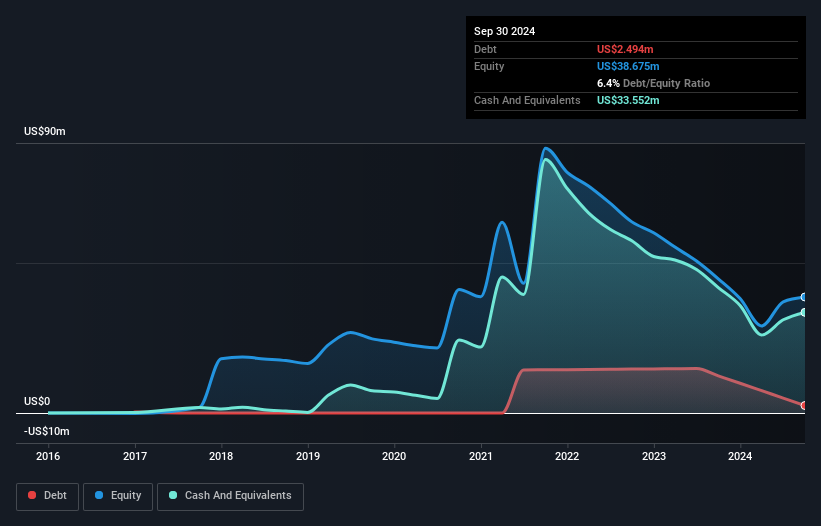David Iben put it well when he said, 'Volatility is not a risk we care about. What we care about is avoiding the permanent loss of capital.' So it seems the smart money knows that debt - which is usually involved in bankruptcies - is a very important factor, when you assess how risky a company is. Importantly, INmune Bio, Inc. (NASDAQ:INMB) does carry debt. But is this debt a concern to shareholders?
When Is Debt Dangerous?
Generally speaking, debt only becomes a real problem when a company can't easily pay it off, either by raising capital or with its own cash flow. Ultimately, if the company can't fulfill its legal obligations to repay debt, shareholders could walk away with nothing. However, a more common (but still painful) scenario is that it has to raise new equity capital at a low price, thus permanently diluting shareholders. Of course, the upside of debt is that it often represents cheap capital, especially when it replaces dilution in a company with the ability to reinvest at high rates of return. The first thing to do when considering how much debt a business uses is to look at its cash and debt together.
View our latest analysis for INmune Bio
How Much Debt Does INmune Bio Carry?
As you can see below, INmune Bio had US$2.49m of debt at September 2024, down from US$12.4m a year prior. But on the other hand it also has US$33.6m in cash, leading to a US$31.1m net cash position.

A Look At INmune Bio's Liabilities
Zooming in on the latest balance sheet data, we can see that INmune Bio had liabilities of US$13.8m due within 12 months and liabilities of US$284.0k due beyond that. Offsetting these obligations, it had cash of US$33.6m as well as receivables valued at US$1.42m due within 12 months. So it can boast US$20.9m more liquid assets than total liabilities.
This excess liquidity suggests that INmune Bio is taking a careful approach to debt. Given it has easily adequate short term liquidity, we don't think it will have any issues with its lenders. Simply put, the fact that INmune Bio has more cash than debt is arguably a good indication that it can manage its debt safely. When analysing debt levels, the balance sheet is the obvious place to start. But ultimately the future profitability of the business will decide if INmune Bio can strengthen its balance sheet over time. So if you want to see what the professionals think, you might find this free report on analyst profit forecasts to be interesting.
Given its lack of meaningful operating revenue, INmune Bio shareholders no doubt hope it can fund itself until it has a profitable product.
So How Risky Is INmune Bio?
We have no doubt that loss making companies are, in general, riskier than profitable ones. And we do note that INmune Bio had an earnings before interest and tax (EBIT) loss, over the last year. And over the same period it saw negative free cash outflow of US$26m and booked a US$41m accounting loss. But at least it has US$31.1m on the balance sheet to spend on growth, near-term. Overall, its balance sheet doesn't seem overly risky, at the moment, but we're always cautious until we see the positive free cash flow. The balance sheet is clearly the area to focus on when you are analysing debt. But ultimately, every company can contain risks that exist outside of the balance sheet. For example, we've discovered 5 warning signs for INmune Bio (2 are concerning!) that you should be aware of before investing here.
At the end of the day, it's often better to focus on companies that are free from net debt. You can access our special list of such companies (all with a track record of profit growth). It's free.
New: AI Stock Screener & Alerts
Our new AI Stock Screener scans the market every day to uncover opportunities.
• Dividend Powerhouses (3%+ Yield)
• Undervalued Small Caps with Insider Buying
• High growth Tech and AI Companies
Or build your own from over 50 metrics.
Have feedback on this article? Concerned about the content? Get in touch with us directly. Alternatively, email editorial-team (at) simplywallst.com.
This article by Simply Wall St is general in nature. We provide commentary based on historical data and analyst forecasts only using an unbiased methodology and our articles are not intended to be financial advice. It does not constitute a recommendation to buy or sell any stock, and does not take account of your objectives, or your financial situation. We aim to bring you long-term focused analysis driven by fundamental data. Note that our analysis may not factor in the latest price-sensitive company announcements or qualitative material. Simply Wall St has no position in any stocks mentioned.
About NasdaqCM:INMB
INmune Bio
A clinical-stage immunology company, focuses on developing drugs to reprogram the patients innate immune system to treat disease in the United States.
Excellent balance sheet with moderate risk.
Market Insights
Community Narratives



